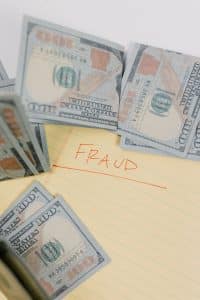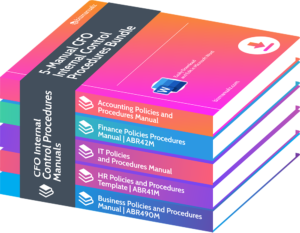What Should a CFO Know About Fraud Prevention and Detection?

As a CFO, you hold a crucial role in the financial health of your company. However, with the rise of fraudulent activities, it is important for you to have a deep understanding of financial fraud prevention and detection. This article will provide you with valuable insights and strategies to protect your company’s financial assets and mitigate potential risks. What should a CFO know about fraud prevention and detection?
What is Fraud?
As a CFO, it is crucial to have a clear understanding of fraud and its implications for your company’s financial health. In this section, we will define fraud and discuss its various forms, so you can be better equipped to prevent and detect potential fraudulent activities.
By gaining a comprehensive understanding of fraud, you can effectively protect your company’s assets and maintain its reputation. So, let’s dive into the world of fraud and its many faces.
Types of Fraud
Fraud can take on various forms and can have a detrimental impact on a business’s finances and reputation. Some common types include:
- Asset misappropriation, where employees misuse or steal company resources.
- Financial statement fraud, which involves manipulating financial records to misrepresent a company’s financial performance.
- Corruption, which can include bribery, kickbacks, and embezzlement.
- Fraudulent billing schemes, where individuals overcharge or submit false invoices for payment.
- Cyber fraud, which encompasses activities such as phishing, identity theft, and hacking.
- Money laundering, a process of disguising the origins of illegally obtained funds.
- Insider trading, where individuals trade securities based on non-public information.
Having an understanding of these types of fraud is crucial for implementing effective measures to prevent and detect them.
Why is Fraud Prevention and Detection Important for CFOs?
It is of utmost importance for CFOs to prioritize fraud prevention and detection due to the significant financial and reputational risks involved. As the ones responsible for safeguarding company assets and ensuring financial integrity, CFOs play a crucial role in protecting their organization. By implementing robust measures to prevent fraud, CFOs can effectively mitigate the risk of financial losses and preserve their company’s reputation.
Additionally, detecting and preventing fraud is essential in maintaining investor confidence and complying with regulatory standards. CFOs also have a vital role in creating a strong internal control environment and promoting ethical standards within the organization. By prioritizing fraud prevention and detection, CFOs can ensure the long-term sustainability and financial health of their company.
What are the Key Elements of a Fraud Prevention and Detection Program?
As a CFO, understanding the importance of fraud prevention and detection is crucial for the financial health and stability of your company. In this section, we will discuss the key elements of a comprehensive fraud prevention and detection program.
These include implementing strong internal controls, conducting regular audits and reviews, providing employee training and awareness, and having a whistleblower hotline in place. By incorporating these elements into your company’s practices, you can minimize the risk of fraud and protect your organization’s assets.
1. Strong Internal Controls
Effective workplace fraud prevention and detection require strong internal controls. To ensure this, CFOs should focus on the following steps:
- Establish Policies and Procedures: Develop comprehensive policies and procedures that clearly outline guidelines for financial transactions and reporting.
- Segregation of Duties: Separate critical financial tasks to prevent a single individual from having complete control over the entire process.
- Regular Monitoring and Review: Implement regular monitoring and review processes to identify any anomalies or suspicious activities.
- Internal Audit Function: Create an internal audit function to independently assess the effectiveness of internal controls and identify areas for improvement.
- Adherence to Regulatory Requirements: Ensure compliance with relevant laws and regulations to minimize the risk of fraud.
2. Regular Audits and Reviews
Regular audits and reviews are essential elements of a comprehensive fraud prevention and detection program for CFOs. These steps help ensure the integrity of financial processes and identify any fraudulent activities. Here are the key steps for implementing regular audits and reviews:
- Establish a schedule for regular audits and reviews, considering the size and complexity of the organization.
- Conduct thorough examinations of financial records, transactions, and internal controls.
- Ensure independence and objectivity by involving third-party auditors or internal audit teams.
- Review and analyze financial statements, supporting documents, and transactional data.
- Verify compliance with internal policies, industry regulations, and legal requirements.
- Identify any red flags or suspicious activities that may indicate fraud.
- Document findings and recommendations for improvement.
- Follow up on audit recommendations and ensure that corrective actions are implemented.
By regularly conducting audits and reviews, CFOs can detect and prevent fraud, safeguarding the financial well-being of the organization.
3. Employee Training and Awareness
Employee training and awareness are essential for CFOs in preventing and detecting fraud. Here are some steps to improve employee knowledge and vigilance:
- Create comprehensive training programs to educate employees on various types of fraud and their consequences.
- Emphasize the importance of internal controls, ethical behavior, and reporting suspicious activities to employees.
- Regularly update training materials to address emerging fraud risks and techniques.
- Provide resources such as fraud prevention policies, procedures, and reporting channels to promote transparency.
- Conduct ongoing awareness campaigns to keep fraud prevention at the forefront of employees’ minds.
By investing in employee training and awareness, CFOs can cultivate a culture of integrity and decrease the likelihood of fraud within their organizations.
4. Whistleblower Hotline
A whistleblower hotline is an essential part of a comprehensive fraud prevention and detection program for CFOs. It offers a secure and confidential means for employees and stakeholders to report suspected fraudulent activities within an organization. The implementation of a whistleblower hotline can:
- Encourage employees to come forward and report potential fraud without fear of retaliation.
- Facilitate timely and effective investigation of reported incidents.
- Prevent further losses by addressing fraudulent activities at an early stage.
- Promote a culture of integrity and transparency within the organization.
How Can CFOs Identify and Mitigate Fraud Risks?
As a Chief Financial Officer (CFO), it is crucial to be aware of and prepared for potential risks of fraud within your organization. In this section, we will discuss how CFOs can identify and mitigate these risks through various strategies.
These include conducting risk assessments to identify vulnerable areas, implementing fraud detection tools to detect suspicious activity, and closely monitoring financial data and transactions for any red flags. By understanding and implementing these measures, CFOs can help prevent and detect fraudulent behavior within their company.
1. Conducting Risk Assessments
Conducting risk assessments is an essential step for CFOs in preventing and detecting fraud. This crucial process helps to identify potential vulnerabilities and evaluate the likelihood of fraud occurring. To conduct effective risk assessments, follow these steps:
- Identify and document potential fraud risks that are specific to the organization’s industry and operations.
- Evaluate the likelihood and impact of each identified risk, taking into consideration historical data, internal controls, and industry benchmarks.
- Assign a risk rating to each identified risk, giving priority to those with a higher likelihood and impact.
- Develop mitigation strategies for high-risk areas, such as strengthening internal controls, implementing fraud detection tools, or enhancing employee training.
- Regularly review and update risk assessments to adapt to changes in the business environment or emerging fraud risks.
2. Implementing Fraud Detection Tools
Implementing effective fraud detection tools is a crucial step in preventing and detecting fraudulent activities within an organization. To successfully implement these tools, follow these steps:
- Identify the specific fraud risks faced by the organization.
- Choose the appropriate fraud detection tools based on the identified risks, such as data analytics software, machine learning algorithms, or anomaly detection systems.
- Ensure that the selected tools are compatible with existing systems and can integrate smoothly.
- Train employees on how to use the fraud detection tools and interpret the generated alerts or reports.
- Regularly update and maintain the fraud detection tools to keep up with evolving fraud techniques.
One company successfully implemented advanced fraud detection software and uncovered a fraudulent scheme where an employee was creating fake invoices. The software flagged the unusual pattern, leading to an investigation that exposed the fraud and saved the company from significant losses.
3. Monitoring Financial Data and Transactions
Monitoring financial data and transactions is an essential aspect of preventing and detecting fraud for CFOs. Here are steps to effectively carry out this task:
- Implement automated monitoring systems that analyze financial data in real-time.
- Regularly review and reconcile bank statements, financial reports, and transaction records.
- Utilize data analytics tools to identify unusual patterns, discrepancies, or anomalies in financial transactions.
- Establish clear protocols for promptly reporting and investigating any suspicious activity.
- Enforce segregation of duties to prevent fraudulent activities.
- Conduct periodic audits to ensure compliance and accuracy of financial records.
What are the Warning Signs of Fraud for CFOs to Look Out For?
As a CFO, it is crucial to be vigilant and proactive when it comes to fraud prevention and detection. In this section, we will discuss the warning signs that CFOs should be aware of in order to protect their company’s financial health.
These signs include unusual financial activity, internal control weaknesses, and employee behavior changes. By being aware of these indicators, CFOs can take necessary measures to prevent and detect fraud within their organization.
1. Unusual Financial Activity
Unusual financial activity can be a warning sign of potential fraud. CFOs should take the following steps to address this concern:
- Review financial statements and transaction records for any irregularities.
- Investigate any sudden changes in revenue, expenses, or cash flow.
- Monitor for unexplained discrepancies or inconsistencies in financial data.
- Conduct interviews with employees involved in financial processes to gather additional information.
- Engage forensic accountants or auditors to conduct a thorough investigation if necessary.
A real-life example of unusual financial activity leading to fraud involves a company’s CFO who noticed a significant increase in expenses without a corresponding increase in revenue. Upon further investigation, it was discovered that an employee had been embezzling funds through fraudulent expense claims. The CFO’s vigilance and prompt action helped uncover and mitigate the fraud.
2. Internal Control Weaknesses
Internal control weaknesses are vulnerabilities in an organization’s systems that increase the risk of fraud. These vulnerabilities can include inadequate segregation of duties, lack of oversight, or ineffective monitoring processes.
By identifying and addressing internal control weaknesses, CFOs can significantly reduce the risk of fraud occurring within their organization. This can be achieved through implementing stronger controls, conducting regular internal audits, and providing ongoing training to employees. By taking these steps, CFOs can create a robust control environment that deters and detects fraudulent activities.
In 2002, the telecommunications company WorldCom experienced one of the largest accounting scandals in history. The company’s internal control weaknesses allowed senior executives to manipulate financial statements, resulting in a misrepresentation of billions of dollars in expenses.
The fraud was eventually detected, and several individuals, including the CEO, faced legal consequences for their actions. This case serves as a reminder of the importance of addressing internal control weaknesses to prevent and detect fraud within organizations.
3. Employee Behavior Changes
Detecting changes in employee behavior is crucial for preventing and detecting fraud. It is essential for CFOs to remain vigilant and be aware of any unusual behavior that may indicate fraudulent activities. Here are steps CFOs can take to effectively identify and address changes in employee behavior:
- Establish a baseline: Understand the typical behavior of employees within the organization.
- Regular monitoring: Continuously monitor employee activities and be on the lookout for any deviations from the norm.
- Implement internal controls: Develop and enforce policies and procedures that promote ethical behavior and discourage fraudulent activities.
- Encourage reporting: Create a secure and confidential reporting system to encourage employees to report any suspicious behavior or concerns.
- Investigate promptly: Take immediate action and conduct thorough investigations when any questionable behavior is reported or discovered.
- Provide training: Educate employees about the importance of ethical behavior and the consequences of engaging in fraudulent activities.
What Should a CFO Do if Fraud is Detected?
If a CFO detects fraud, they must take immediate action to minimize the damage and safeguard the company’s interests. Here are the steps a CFO should follow:
- Secure evidence: Preserve all relevant documents, records, and electronic data that can aid in the investigation of the fraud.
- Notify appropriate parties: Inform the CEO, board of directors, and legal counsel about the fraudulent incident.
- Conduct an internal investigation: Initiate a thorough investigation to determine the extent of the fraud, the involved individuals, and any underlying weaknesses in the system that allowed the fraud to occur.
- Involve law enforcement: If necessary, report the fraud to the appropriate law enforcement agencies for further investigation and potential prosecution.
- Implement corrective measures: Strengthen internal controls, update policies and procedures, and provide additional training to prevent future occurrences of fraud.
By following these steps, a CFO can effectively respond to fraud and safeguard the financial stability of the organization.
CFO Fraud Prevention and Detection
Because fraud prevention and detection carry such substantial financial and reputational risks, CFOs should give them top priority. CFOs are essential to the protection of their company because they are in charge of guaranteeing financial integrity and protecting company assets. Chief financial officers can successfully reduce the risk of financial losses and protect their company’s reputation by putting strong fraud prevention measures in place.
Furthermore, upholding regulatory requirements and preserving investor confidence depend on the detection and prevention of fraud. Additionally, CFOs play a critical role in fostering ethical standards and a strong internal control environment within the company. The long-term viability and financial stability of their organization can be guaranteed by CFOs placing a high priority on fraud prevention and detection.
Frequently Asked Questions

What should a CFO Know about Fraud Prevention and Detection?
As the financial leader of a company, a CFO should have a thorough understanding of fraud prevention and detection to protect the organization from potential losses and legal issues.
Why is it important for a CFO to be knowledgeable about fraud prevention and detection?
Fraud can have serious consequences for a company, including financial losses, damage to reputation, and legal implications. Therefore, it is crucial for a CFO to have a good understanding of fraud prevention and detection to mitigate these risks.
What are some common types of fraud that a CFO should be aware of?
Some common types of fraud include embezzlement, financial statement fraud, and insider trading. It is important for a CFO to be familiar with these and other types of fraud in order to be able to identify potential red flags.
What are some measures a CFO can take to prevent and detect fraud?
A CFO can implement internal controls, such as segregation of duties and regular audits, to prevent and detect fraud. They can also establish a code of ethics and conduct for employees and encourage a culture of transparency and accountability.
How can a CFO stay updated on the latest developments and best practices in fraud prevention and detection?
A CFO can attend conferences and seminars, join professional organizations, and stay updated on industry news and trends to stay informed about the latest developments and best practices in fraud prevention and detection.
What should a CFO do if they suspect fraudulent activity within the company?
If a CFO suspects fraudulent activity, they should immediately report it to the appropriate authorities and conduct an internal investigation. They should also review and update internal controls to prevent future incidents.
















Leave a Reply